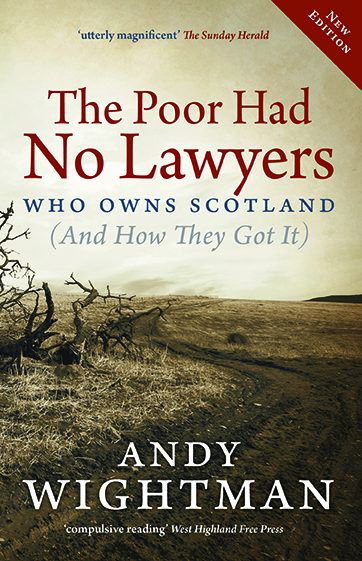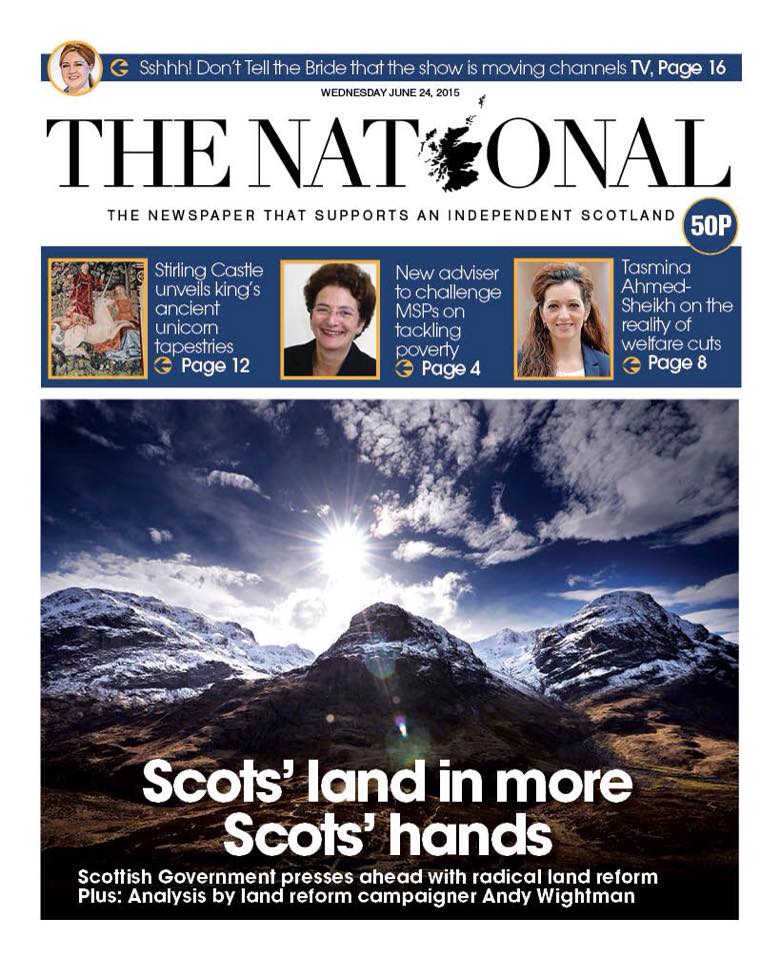Warning: Undefined array key "ssba_bar_buttons" in /usr/home/movgwifi/public_html/yesedinburghwest.info/wp-content/plugins/simple-share-buttons-adder/php/class-buttons.php on line 602
Warning: Undefined array key "ssba_bar_buttons" in /usr/home/movgwifi/public_html/yesedinburghwest.info/wp-content/plugins/simple-share-buttons-adder/php/class-buttons.php on line 602
Warning: Undefined array key "ssba_bar_buttons" in /usr/home/movgwifi/public_html/yesedinburghwest.info/wp-content/plugins/simple-share-buttons-adder/php/class-buttons.php on line 602
 Book Preview: The Poor had no Lawyers: Land Reform in Scotland
Book Preview: The Poor had no Lawyers: Land Reform in Scotland
By Andy Wightman. Please buy the book.
Who owns Scotland? How did they get it? Has the Scottish Parliament made any difference? Can we get our common good land back? In The Poor Had No Lawyers, Andy Wightman updates the statistics of land ownership in Scotland and takes the reader on a voyage of discovery into Scotland’s history to find out how and why landowners got their hands on the millions of acres of land that were once held in common. He tells the story of how Scotland’s legal establishment and politicians managed to appropriate land through legal fixes. From Robert the Bruce to Willie Ross and from James V to Donald Dewar, land has conferred political and economic power. Have attempts to redistribute this power more equitably made any difference and what are the full implications of debt-fuelled housing bubbles? This book provides a fascinating analysis of one the most important political questions in Scotland.
83% of land in Scotland is owned by the private sector. 432 owners have 50% of Scotlands private land, 963 owners have 60% of Scotlands private land. The Scottish Affairs Committee has reported that fewer than 500 people own more than 67% of the privately-owned rural land in Scotland. Jim Hunter claims “Scotland has the most concentrated, most inequitable, most unreformed and most undemocratic land ownership system in the entire developed world”.
How did the landowners get the land in the first place? The book defines 6 land grabs:
- Robert the Bruce – a murdering medieval warlord (feudal to 1500)
- To Spoil the Kirk of Christ of Her Patrimony – Church lands
- The Palladium of Our Land Proprietors – involving the lawyers
- A State of Possession Already Subsisting – the commonties
- Mere Miserable Starved Caricatures – Burgh commons
- I Hereby Take Possession of This Island of Rockall – Colonialism
If the phrase “Mugabe-style land grabs” is appropriate, it belongs to how the establishment stole, cheated and murdered their way to obtain and retain their land. Chapter 13 about the sale of the Cuillin in Skye is instructive. John MacLeod (of Dunvegan Castle) announced in 2000 that he wished to sell the Cuillin for over £10 million. He did not buy the estate. He has no title deeds. He relies on a charter of 1611, which gave his ancestor grazing rights of a maximum of 1600 acres, or arable land of 400 acres, or a mixture of the two. This did not stop him claiming ownership of 23,000 acres – little of which is arable or grazing land. The Crown Estate (to whom the Cuillin should revert) was reluctant to investigate. Labour’s Sarah Boyack and Lib Dem Jim Wallace said “we do not intend to intervene in the private sale of the Cuillin estate”. To prove that justice is blind until money is involved, Mr Drummond Young QC took the view that MacLeod had good title. 8 centuries of property owners making the laws of property will not be easily overturned.
 Land is about power. It is about how power is derived, defined, distributed and exercised. It always has been and it still is thanks to a legal system that has historically been constructed and adapted to protect the interests of private property. There is no sanctity to property rights any more than any other aspect of the law. Landowners own land certainly but they don’t own the law and the rights that underpin it. Property rights are defined by Parliament and they can be amended, adapted and reformed as society sees fit. The one constraint on this is the need to ensure that human rights are respected. The Human Rights Act applies, but it has been decided in court that ‘the compulsory transfer of property from one individual to another may, in principle, be considered to be “in the public interest”’.
Land is about power. It is about how power is derived, defined, distributed and exercised. It always has been and it still is thanks to a legal system that has historically been constructed and adapted to protect the interests of private property. There is no sanctity to property rights any more than any other aspect of the law. Landowners own land certainly but they don’t own the law and the rights that underpin it. Property rights are defined by Parliament and they can be amended, adapted and reformed as society sees fit. The one constraint on this is the need to ensure that human rights are respected. The Human Rights Act applies, but it has been decided in court that ‘the compulsory transfer of property from one individual to another may, in principle, be considered to be “in the public interest”’.
There is a lot more to do. Campaign groups highlight need to overhaul Scotland’s land system to tackle land injustice. Andy Wightman is now an MSP, and can be relied on to pursue this campaign. See also his blog and website Land Matters.
Yes Edinburgh West has a website, Facebook, Twitter, National Yes Registry and a Library of topics on Scottish Politics, including Land Reform.



